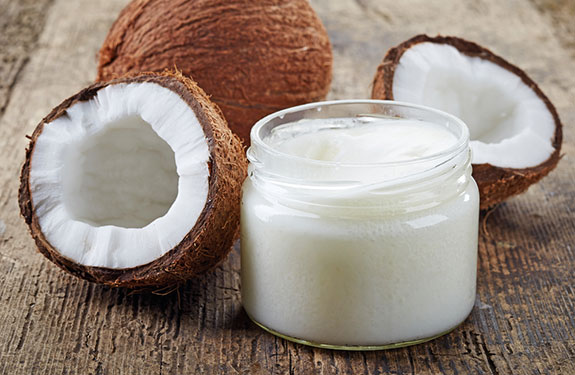
As an Integrative Dietitian Nutritionist, I believe whole-heartedly that food has an incredible power to heal and prevent disease.
When you nourish your body with the right foods you will have everything you need to ignite the healing process, keep disease at bay, and (frankly) feel amazing!
Although I discuss the healing power of food throughout my website, I’ve decided to take a look at some of them in more detail. Let’s dive into week one with an incredible healthy fat with a bit of controversy around its health claims; coconut oil!
Nutritional Make-Up
Coconut oil is derived from the pressing of the dried “meat” of the coconut, also called “copra”.
Unrefined organic coconut oil is considered the gold standard for coconut oils. It is extracted from fresh coconut using a wet-milled fermentation process that protects the beneficial properties of the coconut.
This type of coconut oil has been found to have the highest antioxidant levels and although it still uses heat, it does not seem to harm the oil or reduce the nutrient levels. In fact, the heat may be beneficial and create a higher quality oil.
Hydrogenated coconut oil, on the other hand, is not a healthy fat and should be avoided. Once an oil is hydrogenated it becomes toxic to the body and causes more harm than good.
Fat Content
Coconut oil is primarily saturated fat, which of course makes some folks squirm. But over the last several years, research continues to show that saturated fat may not be the enemy we once thought it was.
Coconut oil contains special saturated fatty acids known as medium chain triglycerides (MCTs); specifically lauric acid, caprylic acid, and capric acid. Why are these so special?
Well, MCTs behave differently in the body than most of the fats we consume. They are digested and absorbed very easily and therefore convert to energy quickly. Rather than the 26 steps required for most fats to be turned into energy, MCTs only require 3 steps. They are so easy on the body, that they are actually the preferred source of fat that we use in the hospital or clinic for those with malabsorption issues.
Nutrient Content
Although coconut oil is clearly mostly fat and calories, it does actually contain a few other nutrients; namely vitamin E, vitamin K, and plant sterols.
What Does The Research Show
According to various research studies coconut oil is considered to be both safe and helpful for various health concerns. Here is a list of just some of the research available on coconut oil. And if you really want to geek out on all things coconut oil, check out the Coconut Research Center website.
- Brain Health: Improves brain health and may even be helpful in both the prevention and management of Alzheimer’s Disease.
- Heart Health: Rather than raise cholesterol levels, the fats in coconut oil have been shown to actually stabilize LDL cholesterol and improve HDL levels; offering more protection against heart attack and stroke.
- Weight Loss: It has been shown to help raise metabolism, curb appetite, improve insulin sensitivity, and improve weight loss efforts, as part of an overall healthy diet. (another study)
- Immune Support: The fatty acids present in coconut oil have antimicrobial properties, which can help the body fight off infection, and benefit the immune system. This particular benefit can prove useful for a variety of infections; including infections in the gut, in the mouth, on the skin, and in the urinary tract.
- Skin Care: Topically it can be used in the treatment of dry, itchy, scaly skin by improving skin hydration and increasing lipid levels on the surface of the skin. It may even offer some sunscreen protection against ultraviolet radiation.
- Arthritis: The high levels of antioxidants present in coconut oil may also help to reduce inflammation and arthritis symptoms.
- Cancer: In an in-vitro study, coconut oil was shown to inhibit the growth of colon cancer cells. Plus coconut oil’s ability to fight off bacterial infection, makes it especially helpful in managing H. pylori infection, which is an increased risk factor for stomach cancer.
- Hormonal Balancing: Saturated fats are important in hormone production and coconut oil in particular may also help with estrogen balance, especially during and after menopause.
I mean who doesn’t want to take advantage of all those benefits? Especially when it comes from a food that is delicious and easy to use.
Coconut Oil Uses
There are so many ways to get coconut oil into your body. Let’s take a look at some of my favorites.
Internally
- Mixed into your morning coffee or tea.
- Added to your smoothies.
- Used as the base oil in cooking or baking. I especially like to use it in my stir-fry and curries.
- It’s also a great choice when sauteeing greens or roasting veggies.
Externally
- Used as a moisturizer and cooling agent on your skin; especially in the presence of acne, eczema, or hives.
- Used on your scalp to help with dandruff or in your hair as an intensive conditioner.
- Used as a carrier oil for essential oils.
- Swished in the mouth to help prevent cavities and gingivitis.
- As a natural (low-level) sunscreen.
Take Home Message
Coconut oil is a safe and healthy fat that should absolutely be part of your Rustic Anti-Inflammatory Diet.
As with all things there is no one food that will provide everything your body needs. Rotating through foods is the best way to make sure you’re taking advantage of all the various nutrients and benefits provided by different foods.
Coconut oil, along with other healthy fats, should be regularly rotated through your diet and added to your skin care routine.